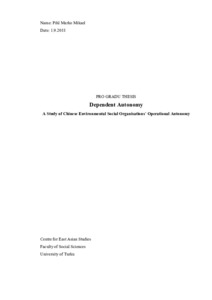Dependent Autonomy : A Study of Chinese Environmental Social Organisation's Operational Autonomy
Pihl, Marko (2018-09-12)
Dependent Autonomy : A Study of Chinese Environmental Social Organisation's Operational Autonomy
Pihl, Marko
(12.09.2018)
Julkaisu on tekijänoikeussäännösten alainen. Teosta voi lukea ja tulostaa henkilökohtaista käyttöä varten. Käyttö kaupallisiin tarkoituksiin on kielletty.
avoin
Julkaisun pysyvä osoite on:
https://urn.fi/URN:NBN:fi-fe2018101038002
https://urn.fi/URN:NBN:fi-fe2018101038002
Tiivistelmä
Whether Chinese social organisations have autonomy has been much debated topic from the beginning of 90s. The Western scholars have mainly argued from two opposing viewpoints. Civil society approach has emphasised civil society’s autonomous nature while corporatist approach has stressed state control and repression. Both approaches grasp some features of the Chinese civil society, but they fail to explain how Chinese social organisations achieve autonomy. More recent developments in this area have paid attention to special characters of the Chinese system and have helped to understand this process more clearly. Chinese scholars have taken different route to understanding of the Chinese civil society. They have emphasised the dual nature of Chinese social organisations. My aim is to combine these different approaches to the more comprehensive understanding of the Chinese social organisations autonomy.
This Pro Gradu thesis questions prevailing western conception of nongovernmental organisations’ autonomy which regards autonomy as independence from the state. Instead it proposes a concept of operational autonomy which links organisation’s autonomy to its actual performance. This is especially fruitful approach to Chinese social organisations which gain autonomy through participating and cooperating with governmental organisations, resulting in autonomy which can be conceptualised as dependent autonomy. This relation can be best understood through a mass line model which encourages social organisations to voluntarily form vertical relations to state and party organisations and officials. Participating in mass line style of relationship is also essential for social organisations’ private funding. Thus, dependent autonomy is a complex mix of operational autonomy, administrative legitimacy and financial independence.
This Pro Gradu thesis questions prevailing western conception of nongovernmental organisations’ autonomy which regards autonomy as independence from the state. Instead it proposes a concept of operational autonomy which links organisation’s autonomy to its actual performance. This is especially fruitful approach to Chinese social organisations which gain autonomy through participating and cooperating with governmental organisations, resulting in autonomy which can be conceptualised as dependent autonomy. This relation can be best understood through a mass line model which encourages social organisations to voluntarily form vertical relations to state and party organisations and officials. Participating in mass line style of relationship is also essential for social organisations’ private funding. Thus, dependent autonomy is a complex mix of operational autonomy, administrative legitimacy and financial independence.
